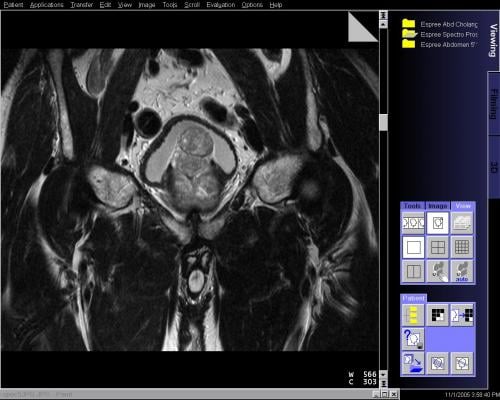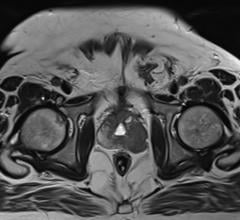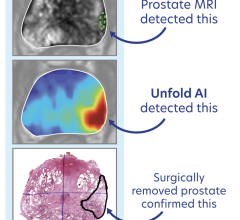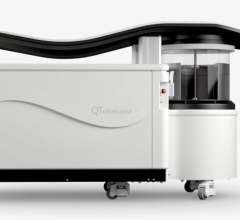
March 29, 2016 — Choosing ongoing monitoring instead of immediate curative treatment (surgery or radiotherapy) leads to a better overall quality of life for men with low-risk prostate cancer. In fact, the quality of life (QoL) is about the same as for men who do not have cancer. These are the findings of a new long-term study comparing active surveillance (AS), immediate curative treatment, and a reference group of men without cancer, presented at the European Association of Urology Congress in Munich.
Prostate cancer is the most common male cancer, with around 400,000 new cases every year in Europe. Most patients are treated quickly by surgery — radical prostatectomy (RP) — or radiotherapy (RT), but both treatments can show significant and distressing side effects, most commonly incontinence or erectile dysfunction.
One alternative which is increasingly considered for patients with less-aggressive cancers is to delay or avoid initial treatment, but instead keeping the patient under AS, meaning that the cancer is regularly monitored with the option of switching to curative treatment if the condition of the tumor changes. Now a new study has examined whether AS actually helps prostate cancer patients to live a better quality of life in the long term.
Detailed questionnaires followed the quality of life of 427 patients (out of the 628 originally contacted), aged between 66-69, who were diagnosed with low-risk prostate cancer and were followed up for between 5 and 10 years after initial diagnosis. One hundred twenty-one of the patients chose active surveillance, whereas 74 had surgery and 232 had radiotherapy. A reference group of 204 men of the same ages who didn't suffer from prostate cancer were also studied.
They found that those patients on active surveillance reported significantly higher QoL scores than those who had undergone surgery (RP). The AS group reported better urinary function (100 vs. 83, p= <0.001), less urinary incontinence (100 vs. 75, p= <0.001) and better sexual function (44 vs. 6, p= <0.001) than men who underwent RP. When comparing AS with radiotherapy, they found that AS gave a significantly higher sexual satisfaction score (44 vs. 18, p= 0.001). Overall, the QoL of men on AS was very similar to that of men without prostate cancer (p>0.05, meaning no statistical difference).
Lionne Venderbos, M.D., of the Department of Urology, Erasmus University Medical Center (Rotterdam) who led the research commented, "This is the first study to look at long-term outcomes in these four different groups. We found that men on active surveillance experienced better prostate-related health than men who underwent radical prostatectomy and radiotherapy. This showed up as better urinary function, less urinary incontinence and better sexual function. Furthermore, we found that the quality of life of men on active surveillance was similar to a group of men without prostate cancer. This is interesting because men on active surveillance still live with untreated cancer as compared to men in the reference group who do not have cancer. The monitoring combined with information on the low-risk nature of men their disease may partly explain the similar quality of life.
"When choosing treatment, it is important that men think about the potential side-effects that are related to immediate curative treatment, like becoming incontinent or losing the ability to have an erection,” Venderbos added. “When considering active surveillance they should try to imagine whether living with untreated cancer would cause any stress, or that the follow-up visits lead to stress instead of reassurance. Balancing the advantages and disadvantages per type of treatment will make sure that a man chooses that type of treatment that fits his wishes and preferences best.”
Alberto Briganti, M.D., (Milano), section editor of European Urology Focus and member of EAU Scientific Congress Committee, said, "This is an interesting study which corroborates the notion that active surveillance is not only safe but well accepted by patients as possible initial management of low-risk prostate cancer. While we could have been anticipated overall lower sexual and urinary function in men treated with surgery or radiation therapy as compared to men receiving AS, it is interesting to note that long-term quality of life of men on AS was comparable to that of men without prostate cancer. Proper patient counseling about safety of AS is key to maintain both good quality of life, and intact psychological and functional well-being over time. We also need to note that it is possible that patients choosing AS may be less disposed to accept any form of treatment, and this might be difficult to uncover via the retrospective comparisons of validated questionnaires."
This work was supported by the Prostate Cancer Research Foundation (SWOP), Rotterdam, The Netherlands.
For more information: www.uroweb.org


 April 25, 2024
April 25, 2024 








